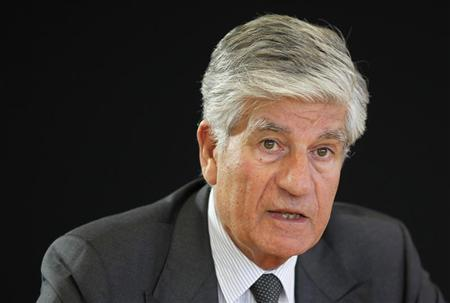Publicis And Omnicom Merging To Form World's Top Ad Firm

Publicis Groupe SA and Omnicom Group Inc. announced a merger Sunday to create the world's biggest advertising group, worth $35.1 billion, an alliance that could put pressure on rivals to do deals to keep pace.
Shareholders of Paris-based Publicis (Paris:PUB) and New York-based Omnicom (NYSE:OMC) will each hold about 50 percent of the new entity, Publicis Omnicom Group. Publicis Chief Executive Officer Maurice Levy and John Wren, his counterpart at Omnicom, will be co-CEOs. Subject to regulatory and stockholder approvals, the creation of a new industry leader with a market value of $35 billion is expected to be completed by the first quarter of 2014, the companies said at a joint press conference in Paris. A press release accompanied the announcement.
“Our ambition together is to create a new standoff for our industry,” Levy, 71, said at the conference in Paris, Bloomberg reported. Wren, who is 10 years younger, said: “This is done with the clear intention that we will create value.”
The transaction marks a return of mega M&A deals among the world's Big Six advertising groups, which have spent the past few years buying up much smaller targets in emerging markets and among Web marketing specialists, Reuters notes.
Publicis said the transaction was expected to create "significant value for shareholders," with expected synergies of $500 million. The merged group will have its headquarters in the Netherlands but keep its chief operating offices in Paris and New York, it said.
"[Wren] and I have conceived this merger to benefit our clients by bringing together the most comprehensive offering of analog and digital services," Levy said, adding that the French government was supportive of the merger.
The deal is likely to push the remaining advertising agencies to consider mergers to keep up. Current leader WPP (London:WPP) may make a move for U.S.-based Interpublic, France's Havas or Japan's Dentsu, said Pivotal Research analyst Brian Weiser in a note reported by Reuters.
"What would have been unthinkable previously would now make sense," he said.
Publicis, Omnicom and London-based WPP have grown through consolidation over decades as they vie with each other for accounts. Global ad spending will probably rise 5.1 percent next year, accelerating from 3.5 percent in 2013, Bloomberg reports, citing ZenithOptimedia, a researcher that’s part of Publicis. Growth may reach 5.8 percent in 2015, ZenithOptimedia said.
Publicis, the third-largest advertising firm, brings a large portfolio of digital assets including Digitas, LBi International and Razorfish, a client roster including Bank of America Corp., Coca-Cola Co. and BMW AG, as well as agencies in emerging markets.
The strength of Omnicom, ranked second and whose customers include PepsiCo Inc. (PEP), Nissan Motor (7201) Co. and Royal Philips NV, lies in its U.S. business. Accounts that currently overlap include McDonald’s Corp. and Procter & Gamble Co. (PG)
Together, Publicis and Omnicom had combined 2012 revenue of $22.7 billion, with more than 130,000 employees, and they would overtake WPP, worth $24.1 billion.
The deal would bring together Publicis brands such as Saatchi & Saatchi and Leo Burnett with Omnicom's BBDO Worldwide and DDB Worldwide.
Wren and Levy will be joint CEOs for an initial integration and development period of 30 months, after which Levy will become non-executive chairman and Wren sole CEO, Publicis said. Publicis shareholders will receive one newly-issued ordinary share of Publicis Omnicom Group for each Publicis share they own, plus a special dividend of 1.00 euro per share. Omnicom shareholders will receive 0.813 newly issued ordinary shares of Publicis Omnicom Group for each Omnicom share they own, together with a special dividend of $2 per share. They will also receive up to two regular quarterly dividends of $0.40 per share.
Publicis said the deal, which was unanimously approved by the boards of both companies, was expected to close in the fourth quarter of 2013 or the first quarter of 2014. Levy said the merger would boost adjusted earnings per share and that the new company would keep its BBB+ debt rating.
The head of rival French advertising agency Havas criticized the merger before the official announcement, saying it was not in the best interests of clients or staff.
"I'm not sure this is in the best interests of their clients or their talent," Havas chief executive David Jones said in a statement. "Clients today want us to be faster, more agile, more nimble and more entrepreneurial, not bigger and more bureaucratic and more complex."
"It's a massively interesting and surprising move," Jones said. "The industry's obsession with mergers and acquisitions still amazes me, particularly in a world where digital and technology have made scale irrelevant."
The CEO pointed to Instagram and Facebook as examples of companies that operate with slim staffing but have vast numbers of clients.
"Our business is very simple: It's about clients and talented employees, and as I said, I'm not sure this move is good for either of them," Havas' Jones said.
The proposed combination will probably attract regulatory scrutiny in Europe and the U.S., given the companies’ overlap and potential market share. Taken together, they spent $3.34 billion in media placements for clients last year, according to data compiled by Advertising Age. That would have accounted for 41 percent of total spending by the top 10 media agencies in the world. WPP, by contrast, made up 32 percent at $2.6 billion.
Both CEOs said at the press conference that they don’t expect regulatory hurdles.
© Copyright IBTimes 2024. All rights reserved.



















